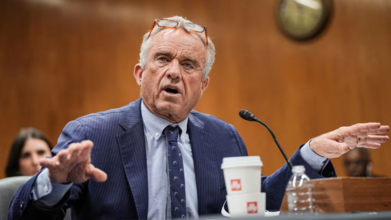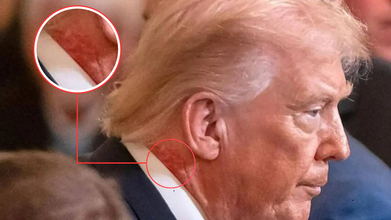- Health Conditions A-Z
- Health & Wellness
- Nutrition
- Fitness
- Health News
- Ayurveda
- Videos
- Medicine A-Z
- Parenting
RFK Jr. Overhauls And Shakes-Up The Vaccine Advisory Panel Again, Find Out The Who’s Who On This New Team

Credits: Reuters
As the new school year approached, families expected familiar guidance on vaccines. What they got instead was upheaval: Secretary of Health and Human Services Robert F. Kennedy Jr. dismissed all 17 members of the CDC's Advisory Committee on Immunization Practices (ACIP)—the body whose recommendations form the basis for state immunization mandates.
This fall, as families gear up to meet school immunization requirements, Robert F. Kennedy Jr. quietly launched a dramatic reshaping of U.S. vaccine guidance. Despite assuring senators he’d maintain the independence of the Advisory Committee on Immunization Practices (ACIP) during his confirmation, Kennedy dismissed all 17 expert members of the CDC’s ACIP in June 2025—a move widely criticized as political and destabilizing. He presented it, however, as necessary to “restore public trust” and rid the committee of pharmaceutical influence.
Just days later, eight new members were named—though one withdrew amid ethics concerns. Unlike their predecessors, this panel includes only one epidemiologist and one infectious disease specialist, with no virologists or immunologists. Many appointees lack peer-reviewed vaccine research altogether, and those who do have published, on average, 78% fewer vaccine-related papers than former members.
Within hours of the overhaul, leaders from nearly 100 medical groups—including the American Medical Association and American Academy of Pediatrics—warned that the dismissals could sow confusion among doctors and patients, ultimately increasing preventable illnesses.
Several states—including Colorado, New York, and Massachusetts—are now advancing legislation to ensure vaccine insurance coverage regardless of shifts in ACIP recommendations. At the same time, independent groups like the Vaccine Integrity Project and organizations such as the American College of Obstetricians and Gynecologists are stepping in with their own evidence-based guidelines.
List of RFK Jr.'s New Vaccine Advisory Panel Members
Here’s a closer look at the individuals now shaping the future of U.S. immunization guidance:
Robert W. Malone, MD – Physician and Biochemist
Dr. Robert Malone is widely recognized as a polarizing figure in the vaccine debate. A physician and biochemist, Malone has publicly claimed to have contributed to the foundational research that led to mRNA vaccine technology, though many scientists dispute the extent of his role. In recent years, he emerged as a prominent skeptic of COVID-19 vaccine safety and a central voice in misinformation campaigns during the pandemic.
His statements have repeatedly landed him in hot water with the medical community. Notably, he was criticized for publicly denying that Daisy Hildebrand, an 8-year-old girl, died of measles—despite confirmation from her family and medical professionals. Critics argue that his inclusion on the new panel undermines credibility, particularly given his history of promoting unverified claims through high-traffic media appearances and social media platforms.
Joseph R. Hibbeln, MD – Psychiatrist and Neuroscientist
Dr. Hibbeln, a psychiatrist and nutritional neuroscientist, spent nearly three decades at the National Institutes of Health (NIH), where he led research on the role of omega-3 fatty acids in mental health. Though respected for his work in nutritional psychiatry, Hibbeln has no formal background in virology, immunology, or vaccine development.
His appointment raised eyebrows further after Reuters reported his involvement as an expert witness in a lawsuit against Merck over its human papillomavirus (HPV) vaccine—litigation that also has ties to Robert F. Kennedy Jr.’s broader vaccine-critical advocacy efforts. While his clinical credentials are solid, his experience with vaccine policy is limited.
Martin Kulldorff, PhD – Biostatistician and Epidemiologist
Among the more experienced appointees, Dr. Martin Kulldorff is a biostatistician known for his role in developing vaccine safety surveillance tools at the CDC. He has previously served on the FDA’s Drug Safety and Risk Management Advisory Committee and was part of the CDC’s COVID-19 Vaccine Safety Technical Work Group.
However, Kulldorff gained national attention—and sharp criticism—for co-authoring the Great Barrington Declaration, an open letter that argued against pandemic lockdowns and supported herd immunity through natural infection. His outspoken opposition to school closures and COVID-19 mandates eventually led to his dismissal from Harvard’s faculty. Though undeniably experienced in data analysis and public health, his stance during the pandemic has made him a polarizing figure in vaccine discourse.
Retsef Levi, PhD – Operations Management Professor
Dr. Retsef Levi, a professor at MIT Sloan School of Management, holds a doctorate in operations research and has worked extensively in systems optimization and supply chain logistics. However, he is not a medical doctor and lacks formal training in immunology or infectious disease.
Levi has been an outspoken critic of mRNA vaccines, publicly claiming in early 2023 that the technology posed "indisputable" risks—including death, especially in younger populations. He called for their immediate suspension, drawing widespread criticism from scientific institutions. His appointment to the committee suggests a shift toward elevating voices that challenge the scientific consensus, raising concerns about evidence-based decision-making.
Cody Meissner, MD – Pediatric Infectious Disease Specialist
Among the few on the panel with direct vaccine expertise, Dr. Cody Meissner is a well-respected pediatric infectious disease expert and professor at Dartmouth’s Geisel School of Medicine. He has served as chief of the Pediatric Infectious Disease Division at Tufts Medical Center and held a seat on the prior ACIP panel, giving him insider knowledge of how immunization policies are formed.
Despite his qualifications, Meissner has also drawn criticism for his opposition to masking mandates and COVID-19 vaccine requirements for children during the pandemic. Still, he stands out as the panel’s most credentialed expert. Notably, he was the only member of the newly reformed committee to vote against rescinding recommendations for flu vaccines that contain thimerosal—a preservative that some skeptics claim is linked to autism, a theory repeatedly debunked by decades of research.
Vicky Pebsworth, RN, PhD – Registered Nurse and Vaccine Safety Advocate
Dr. Vicky Pebsworth brings over 45 years of nursing experience and has previously served on the FDA’s Vaccine and Related Biological Products Advisory Committee. She currently sits on the board of the National Vaccine Information Center (NVIC), a controversial group known for promoting vaccine injury awareness and advocating for personal belief exemptions.
Pebsworth’s views are informed in part by personal experience: her son reportedly suffered serious long-term health issues following vaccination. Her role with the NVIC and emphasis on vaccine injury prevention raise questions about bias, though Kennedy has pointed to such perspectives as “essential for reestablishing balance” in vaccine discussions.
James Pagano, MD – Emergency Physician
Dr. James Pagano is an emergency room physician who has served on various hospital committees related to critical care and medical utilization. Unlike others on the panel, Pagano does not have a background in epidemiology, virology, or public health, nor does he appear to have any published research on vaccines.
His role on the advisory panel seems to reflect Kennedy’s broader strategy of diversifying input beyond traditional academic or government sources, though critics argue this risks sidelining science in favor of anecdote.
The previous panel's inaugural June meeting was marked by confusion and controversy. Key proposals under consideration included the removal of thimerosal from flu vaccines and a review of the cumulative childhood immunization schedule—topics long rejected by medical mainstream but popular among vaccine skeptics.
Presenters included anti-vaccine figures, such as Lyn Redwood of Kennedy’s own children’s health advocacy organization. Conflicts of interest and lack of published ethics reviews further marred the panel’s debut. The American Academy of Pediatrics even boycotted the meeting in protest.
- Why These Changes Are Coming At A Bad Time For US Healthcare?
The timing couldn’t be worse. The U.S. is battling its worst measles outbreak in decades, with 1,333 confirmed cases—of which 92% occurred among unvaccinated individuals.
Kennedy’s sweeping changes and public vaccine skepticism have emboldened parents to seek exemptions. Recent polls show nearly 60% of Americans are now inclined to skip COVID-19 vaccines, raising red flags for public health professionals.
Robert F. Kennedy Jr.’s ACIP overhaul isn’t just bureaucratic—it’s deeply political. His stated objective of restoring public trust mirrors his long-standing critique of pharmaceutical influence. But replacing experts with skeptics? That risks forfeiting trust altogether.
Like swapping plane pilots at takeoff, ACIP's dismantling invites more than concern—it threatens the foundation that has long kept Americans safe from disease.
Tamil Nadu Increases Preventative Chickenpox Measures As Cases Rise

Credit: Canva
Tamil Nadu health authorities have ramped up surveillance efforts and implemented preventive and control measures to curb rising chickenpox cases in the state.
The Directorate of Public Health (DPH) and Preventive Medicine has instructed all health officers to intensify active and passive surveillance in all government and private health facilities, schools, colleges and hostels.
They were also directed to ensure that all suspected and confirmed cases are entered into the Integrated Disease Surveillance Programme (IDSP) line list with complete demographic and clinical details.
All medical officers across the state have further been asked to be alert to differentiate chickenpox from other rash illnesses such as measles, rubella, and hand, foot and mouth disease.
This comes weeks after doctors across Pune also warned against the exponential rise in chickenpox cases this winter.
Dr Shirish Kankariya, head of paediatrics at Apollo Hospital Swargate, said he had seen around 15 chickenpox patients in Jan alone, and the current season has brought a visible uptick in cases.
"Chickenpox cases have risen. We are also seeing infections in older children and adult family members, who never had the disease earlier," he told Times of India.
Dr Prateek Kataria, consultant pediatrician and neonatologist at Sahyadri Hospital also noted that out-patient departments (OPDs) have recently seen a large increase confirmed chickenpox cases this year.
He also told the publication: "We are seeing many children with chickenpox in the OPD even among those who have taken both doses of the vaccine. This is expected because the vaccine does not guarantee 100% protection, but vaccinated children usually develop milder illness and do not need hospitalization."
What Is Chickenpox And How Does It Spread?
Chickenpox, caused by the varicella-zoster virus, is extremely contagious and spreads through respiratory droplets or direct contact with someone who is infected. In children, it often starts as a mild rash accompanied by fever, but it can spread quickly in crowded areas.
The virus can also be transmitted through coughing or sneezing, and it is most infectious a day or two before the rash appears and in the early days of the rash. In individuals with weak immunity, the dormant virus may reactivate later in life, causing shingles (herpes zoster).
How To Detect Chickenpox Symptoms Early?
Spotting chickenpox early means looking for general warning signs like fever, fatigue, headache, and loss of appetite, which usually appear one to two days before the rash.
The rash itself starts as tiny red spots that later form fluid-filled blisters and eventually scab over. Paying attention to these early symptoms, especially after known exposure, can help identify the infection sooner.
How To Spot A Chickenpox Rash
The first rash usually shows up as small red bumps on the face, chest, or back. These bumps quickly turn into blisters filled with fluid, which are contagious. Over a few days, the blisters break and crust over, forming scabs. It’s common to see spots, blisters, and scabs all at the same time, according to the CDC.
Stages Of Chickenpox
The Mayo Clinic explains that chickenpox progresses in three main stages:
- Incubation Stage (10–21 days): After exposure, the virus remains inactive. Infected individuals typically show no symptoms during this period.
- Prodromal Stage (1–2 days): Early signs include fever, tiredness, headache, loss of appetite, and body aches. This is also when the virus can start spreading to others.
- Rash Stage (5–10 days): Red, itchy spots appear first on the face and chest, spreading across the body. These spots develop into fluid-filled blisters that scab over within a few days. Mild fever, itching, and discomfort are common during this stage.
Breast Cancer To Reach Over 3.5 Mn By 2050, Deaths To Surge 44% Predicts Lancet Study

Credit: Canva
A new study published in The Lancet Oncology journal today revealed that breast cancer continues to be the most common cancer among women worldwide, and predicted that the number of new cases of the deadly disease will reach more than 3.5 million globally in 2050 -- rising by a third from 2.3 million in 2023.
The Global Burden of Disease analysis with data from 204 countries revealed that despite advancements in breast cancer treatments, yearly deaths from the disease will rise by 44 percent -- from around 764,000 to 1.4 million.
While breast cancer disproportionately impacts countries with limited resources, maintaining a healthy lifestyle, including not smoking, getting sufficient physical activity, lowering red meat consumption, and having a healthy weight were found to prevent over a quarter of healthy years lost to illness and premature death.
“Breast cancer continues to take a profound toll on women’s lives and communities,” said lead author Kayleigh Bhangdia from the Institute for Health Metrics and Evaluation (IHME), University of Washington, US.
“While those in high-income countries typically benefit from screening and more timely diagnosis and comprehensive treatment strategies, the mounting burden of breast cancer is shifting to low- and lower middle-income countries where individuals often face later-stage diagnosis, more limited access to quality care, and higher death rates that are threatening to eclipse progress in women’s health,” Bhangdia added.
Inequalities In Breast Cancer Burden
The study revealed that the rates of new cases remain highest in high-income countries (HICs), but are growing fastest in low-income countries (LICs).
Women in low- and lower-middle-income countries accounted for 27 percent (around 628,000) of new cases globally, exposing likely disparities in timely diagnosis and shortages of quality treatment, including radiotherapy machines, chemotherapy drugs, and pathology labs, and standard treatments.
In 2023, an estimated 2.3 million new breast cancers were diagnosed worldwide in women (with 73 percent or 1.67 million cases occurring in high- and upper-middle-income countries). Of these, 764,000 ended in deaths (with 39 percent or 300,000 deaths occurring in low- and lower-middle-income countries).
Further, the number of years of healthy life lost due to poor health and early death more than doubled from 11.7 million years in 1990 to 24 million years in 2023.
Women in low- and lower-middle-income countries also contribute to more than 45 percent of all the ill-health and early deaths from breast cancer globally (nearly 11 million years of healthy life lost).
Three-fold Rise In Pre-menopausal Breast Cancer
The study reported a three-fold rise in pre-menopausal breast cancer in women aged 55 or older in 2023 -- compared to women aged 20-54 years.
However, rates of new cases have risen in women aged 20-54 years (up 29 percent) since 1990, with rates in older women remaining relatively unchanged.
Major Lifestyle Risk Factors
In 2023, 28 percent of the global breast cancer burden (6.8 million years of healthy life lost to disability, illness, and early death) was linked to six potentially modifiable risk factors. These include:
- High red meat consumption -- linked to nearly 11 percent of all healthy life lost
- tobacco use (including second-hand smoke; 8 percent),
- high blood sugar (6 percent),
- high body mass index (4 percent),
- high alcohol use and low physical activity (both 2 percent)
Substantial progress has been made in reducing the global breast cancer burden linked to high alcohol use and tobacco between 1990 and 2023, which declined by 47 percent and 28 percent, respectively.
Donald Trump's Neck Appears To Have Redness And Rashes, White House Says A Skin Cream Caused It

Credits: AP
Donald Trump is again in the news, this time not for his cognitive conditions and speculations around it, but for a skin rash and redness around his neck. During a Medal of Honor ceremony in the East Room of the White House, many pointed out the redness around his neck and asked if there was any underlying medical reason to it. The close-up photos shows clear red marks around the 79-year-old president's neck.
Also Read: Breast Cancer To Reach Over 3.5 Mn By 2050, Deaths To Surge 44% Predicts Lancet Study
Why Does President Trump Have Red Rashes Around His Neck?
As per the White House, this redness around his neck is due to a skin cream he has been using. However, the White House has not given any specific reason behind the treatment for which the skin cream has been prescribed. "President Trump is using a very common cream on the right side of his neck, which is a preventative skin treatment, prescribed by the White House Doctor,” Sean Barbabella, the president's doctor, said in a statement. “The President is using this treatment for one week, and the redness is expected to last for a few weeks.”
No follow-up questions on the treatment were given, neither any clarity was given on the condition. However, zoomed in photos from as far back as the Board of Peace meeting at the US Institute of Peace on February 19 too show the redness on President's neck.
Topical treatments can sometimes lead to temporary skin irritation, flushing, or redness - especially if they contain active ingredients like retinoids, benzoyl peroxide, alpha hydroxy acids, or prescription-strength dermatological compounds.
Trump’s medical report from his April 2025 physical exams has noted he was on mometasone cream “as needed” for an unspecified skin condition.
Also Read: Ashley Dalton Diagnosed With Incurable Breast Cancer Stands Down From Her Position
Why Do Skin Cream Cause Redness And Rashes?
While this is not true for all creams, some skin cream could make your skin red by increasing the turnover of cells that stimulate collagen production or reduce inflammation.
In this process, the skin may appear red, slightly inflamed, or sensitive – especially in areas like the neck, which tends to have thinner skin than the face.
Common reasons for redness caused by skin cream include:
- Irritant contact dermatitis
- Allergic reaction to ingredients
- Increased blood flow from active compounds
- Over-application of product
- Sun sensitivity after use
- Skin around your neck may especially react more visibly than other areas due to its delicate texture.
When should redness be a concern?
Even though temporary redness from skincare products is usually harmless, doctors say you must always use creams after a prescription and reach out to them in case of:
- Severe burning or itching
- Blistering or peeling
- Swelling of the face or throat
- Symptoms lasting more than a few days
- Signs of infection
- In most cases, discontinuing the product allows the skin to return to normal within a short period.
© 2024 Bennett, Coleman & Company Limited

